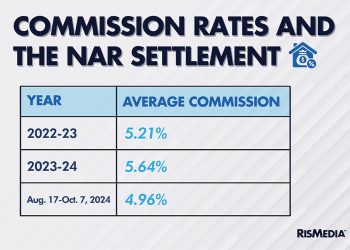The world of real estate is shifting. Is technology taking hold of an industry that was traditionally all about in-person interactions?
Relative to other occupations, real estate careers are low on the list of digitalization. According to a new report from the Brookings Institution, Digitalization and the American Workforce, real estate, including the rental and leasing segments, scored a 45 mean digital score in 2016. Scores range between zero and 100, with those over 60 considered high digital occupations. But since 2002, the industry has made strides, with its score increasing by 19 points, up from 26.
While clients are still at the heart of the transaction for the majority of brokerages, other segments of the business have dramatically changed from just a few years ago. The digitalization of the industry is slowly progressing, and brokers and agents have different things to say about the benefits, challenges, opportunities and how to best adapt to a world run by tech. RISMedia spoke to three industry experts to gauge what their experience has been thus far, and where they see real estate tech going in the future.
Human at Heart
While viewpoints are mixed, they all share one similarity: Real estate will always need the human touch.
“Ultimately, when a consumer buys or sells a home, it’s one of the most emotional moments of their life,” says Mitch Robinson, chief marketing officer of eXp World Holdings. “For this, digitalization is not the key. Having a great local, personal advocate that is your real estate agent—that’s what matters most.”
Dustin Cheatham, a REALTOR® with CENTURY 21 Select Real Estate, Inc., wholeheartedly agrees, standing firm that websites and automation are not posing a risk to the agent career, and that the value will always be there even for consumers who embrace technology.
“Tech-savvy people are still choosing to work with REALTORS® and even pay a traditional commission amount,” says Cheatham. “The No. 1 reason is because this job is so complex. Homeowners’ lives are too busy to try to do a REALTORS®’ job better and more successfully and save a commission.”
Cheatham says agents can save clients from being taken advantage of and “save them from a failed transaction,” and that’s why they’re worth the commission.
Cheryl Eidinger-Taylor, COO of ERA Key Realty Services, has seen a huge focus on the digital in recent years. Some of these tech-driven tasks include:
- Searching on mobile devices
- Sharing and signing documents on a digital platform
- Negotiation and communicating via text or email
- Connecting with clients through social media
But she agrees that there are some aspects of real estate that will remain human.
“There are still many things that the consumer wishes to do in person, so while digitalization has streamlined many aspects of the process, it has not taken away the decision-making pieces that remain, for most consumers, a personal experience,” says Eidinger-Taylor. “For the typical home-buying consumer, viewing homes would be one of those things that is still preferably done live and in person.”
Is Digital the New Way?
All of this doesn’t mean that other parts of the business haven’t benefitted from a technology takeover, however. Eidinger-Taylor says she’s seen a shift toward the digital approach, especially to keep up with the busy lifestyles of today’s consumers.
“One example of this is the signing of an offer or the initialing of the changes in a negotiated offer,” she says. “This no longer requires a sit-down in person, or two people driving to meet by the side of the road for initials.”
For a brokerage like eXp, technology is a major focus, and they’ve seen extensive growth because of that. Robinson says over 23,000 agents engage in eXp World, the company’s virtual office base, which helps facilitate less time-consuming communications while still keeping things engaging and interactive.
“At eXp Realty, digitalization has become a big part of our success,” says Robinson. “It allows our agents not to have expensive brick and mortar locations and promotes real-time engagement. Agents can get advice from other agents, attend real-time training, and more.”
CENTURY 21 Select Real Estate has also embraced the digital, according to Cheatham. He says his brokerage has “fully integrated into the digital space.”
“We’re on social media, consumer websites, follow-up campaigns with clients,” says Cheatham. But he maintains that clients need a lot of non-digital help too.
“All the tech is wonderful when it saves time and we love that!” says Cheatham. But when it comes to things like consultations, he says actions like “looking with our eyes, doing things with our hands like changing out a door handle, rearranging some furniture for better service,” and more, is done “in an efficient way with human power.”
Leveraging Technology, the Right Way
It’s not just about diving headfirst into the latest gadgets, say experts. Brokerages and agents should solely focus on technology that helps to streamline and automate.
“There is so much technology in the real estate space and more available each and every day,” says Robinson. “The key is measuring the effectiveness of that technology. I’ve been saying for a long time, the best technology is the technology you will actually use to run your business effectively.”
Eidinger-Taylor says her brokerage has been attracted to programs like dotloop because it’s largely automated and helps in storing and signing documents while keeping the data secure. They have also moved their telephone systems to VOIP (Voice Over IP) and cellphones, embraced social media, and offered training on all of their tech tools to keep agents and brokers up to date on how things work and what some of the legal ramifications are in terms of data security, wire fraud, etc.
“The impact is positive in that things can be done more conveniently for the consumer and that real estate professionals can spend more time doing more productive tasks for their clients,” says Eidinger-Taylor.
She’s seen the following benefits from moving to a more digital approach for communication modes, searching platforms and transactional tasks:
Drastically cutting down on driving time
Enabling clients to bid more quickly in competitive situations
Allowing agents to do more research at their computers instead of driving to town halls
But, she says, “the negative implications are those that occur when the digital replaces personal completely.”
That last statement is something Cheatham can relate to, suggesting that if agents and brokers are worried about “websites carving away at their jobs or commissions,” it’s probably because they are focused on the wrong thing.
“The way to view this career is as a customer service industry,” says Cheatham. “With our own intuition and creativity, agents can demonstrate value in just about every customer situation.”
Finding a Balance
While going paperless and digitizing office processes can be beneficial, it should always be about making a real difference for agents, says Robinson.
“In the future we will continue to be agent success-obsessed, meaning understand our agents’ needs first, and then find the solution.”
Eidinger-Taylor says she expects there to be continuing breakthroughs in the tech space when it comes to real estate, stating her goal for the company is that they “innovate within our structure and embrace the products and tools that are most helpful to both the consumer and our professions.”
At the same time, with tasks related to connecting on a human level, she says there should be a continued focus on “voice inflection and emotions displayed” because they are critical to communicating with clients and co-operating real estate professionals.
“It’s important that we do not forget that buying or selling a home is a very personal and emotional experience, often tied to a life event,” says Robinson. “Digitalization is there for all the right strategic reasons, but if we forget we are ultimately working with a human being, we are all in trouble.”
 Liz Dominguez is RISMedia’s associate content editor. Email her your real estate news ideas at ldominguez@rismedia.com.
Liz Dominguez is RISMedia’s associate content editor. Email her your real estate news ideas at ldominguez@rismedia.com.











No mention of websites. AND a recent NAR Profile of Realtors indicated that agents report ZERO leads from their websites. And now websites have to be ADA compliant! Will this be the first piece of digitization to fall by the wayside? I like your work 🙂 Jim Smith
Having been involved with real estate for investment for over 30 years as well as helping sellers and buyers with real estate transactions for 27 years, no amount of computerization will ever replace real estate agents in doing what we do. What the computers and programs do is just a tool. However, when computers can start doing what we do as real estate agents on a daily basis, I will happily retire.
I am a real estate broker with 20 years experience as an agent/broker. Yet, to sell my last three properties I hired an agent at 6% . Here is Why: 1. I had the opportunity to mentor an enthusiastic new agent. 2. I knew I would be really pissed at buyer requests. 3. I tend to micro manage and felt the agent would be earning the commission dealing with me. 4. I had other things to do than be there for open houses and inspections.